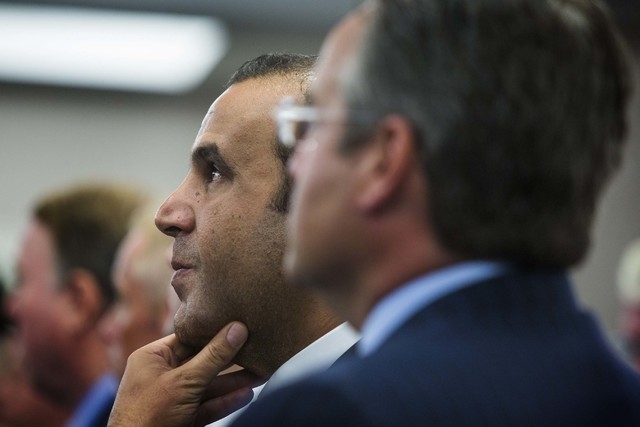Some advice for Nazarian: Be contrite, honest, forthright

Sam Nazarian hasn’t asked me for advice. But I’ll give it to him anyway.
When he appears Thursday at the Nevada Gaming Commission meeting, Nazarian — the visionary behind SLS Las Vegas — should accept the Dec. 3 recommendation by the Gaming Control Board for a one-year limited gaming license with about a half dozen conditions.
One provision bars Nazarian from having any say over the SLS casino.
During a painful 3½-hour hearing in Carson City, Nazarian heard the words “potential denial” uttered by regulators. The testimony included evidence of drug use by Nazarian and dealings with an extortion suspect that cost him $3 million.
When he faces those same questions from the Gaming Commission, Nazarian’s answers should be contrite and honest. Most of all, he can’t appear evasive. He shouldn’t repeat his Control Board appearance.
Nazarian, 39, founder and CEO of Los Angeles-based nightlife and restaurant operator SBE Entertainment, was downcast after the Control Board hearing. He should be relieved.
The Control Board vetted his issues in a public forum and exposed them for the world. But the regulators gave him a chance to correct those errors.
Nazarian danced around uncomfortable questioning. Control Board member Terry Johnson said Nazarian lacked candor. Control Board member Shawn Reid said Nazarian worried only about public perception.
Nazarian was advised in Carson City by Las Vegas gaming attorney Tony Cabot of Lewis and Rocha and ex-Control Board Chairman and state Sen.-designate Mark Lipparelli.
Nazarian, a onetime Hollywood film producer, needs a better performance from himself.
To his credit, he took responsibility for the dealings the past seven years with Derrick Armstrong, a convicted felon described by Los Angeles attorney Joseph Taylor as a “barnacle” and a “parasite.” Nazarian said Armstrong “seemed to show up” and demand money every time SBE had a major event.
Nazarian did what any business executive of his stature should do when faced with a hanger-on: he turned the matter over to legal advisers and underlings. One SBE executive admitted he “screwed up” and “failed Sam.”
As for the drug use, the crime wasn’t that Nazarian used cocaine during an April “guys weekend” in Cabo San Lucas, Mexico — a “one-time indiscretion” he told the Control Board. He was evasive about the matter during interviews with state gaming agents.
Nazarian has to be candid when questioned by the Gaming Commission. One of the license conditions is random drug testing, something he should publicly embrace.
A license denial would have been a death blow to SBE’s 10 percent stake in the $415 million SLS Las Vegas. It also would have sent mixed signals about the north Strip casino’s future. SLS opened with tremendous fanfare in August but has hit some speed bumps in the past few months.
Nazarian should tell the commission about SBE’s prospects as a fast-growing hospitality company with revenue totaling $500 million annually, according to one industry publication.
SBE operates more than two dozen nightclub brands and restaurant concepts, nine of which were brought to the SLS Las Vegas. Nazarian opened the Hyde Lounge nightclub in the Bellagio in 2012. SBE has SLS hotels in Los Angeles, Beverly Hills, Calif., and Miami’s South Beach. New SLS hotels have been signed for the Middle East, New York City, the Bahamas, Philadelphia and Seattle.
This month, Nazarian recapitalized SBE for $350 million and formed a strategic real estate investment partnership with Cain Hoy Enterprises of Greenwich, Conn.
That success got lost underneath the drug and extortion matters.
“I know that it’s been hard talking about these things,” Control Board Chairman A.G. Burnett told Nazarian. “What we’ve been talking about is the tip of an iceberg, and the rest of that iceberg is your success in business.”
Nazarian should tell the commission he’ll be a model citizen, he’ll abide by the license conditions, and he’ll return in December 2015, hoping to show that he’s worthy of a full gaming license.
Las Vegas loves a comeback story.
The limited license won’t affect operations of the SLS Las Vegas. San Francisco-based private equity company Stockbridge Real Estate owns 90 percent, and its executive director, Terry Fancher, is the hotel-casino’s CEO. In October, former Station Casinos executive Scott Kreeger was brought in as president to help shore up the gaming business.
SBE also can petition the Control Board chairman to claim its share of any SLS Las Vegas profits.
Control Board members have been criticized unfairly by naysayers who think regulators should have denied Nazarian, rather than voting 2-to-1 — Reid voted no — for the limited license.
Denial could have set a terrible precedent for future Strip investment; essentially you would have to be an angel for just 10 percent ownership and zero casino control.
Despite the blemishes, Las Vegas needs more folks like Nazarian with new ideas.
Old-timers hate hearing this, but Las Vegas is no longer about gaming. You easily can find casinos almost anywhere in the country, including the Strip’s largest feeder market, Southern California.
Las Vegas’ financial health depends on nongaming attractions to keep tourists interested and coming back. About 65 percent of the Strip’s revenue is from outside of the casino.
The two most important developments in the past 18 months are Caesars Entertainment Corp.’s Linq and its 550-foot High Roller observation wheel, and MGM Resorts International’s Park. Neither project adds a slot machine or table game.
Without these types of endeavors, the Strip would be Atlantic City without the beach.
Nazarian was deeply committed to SLS Las Vegas, a project he stuck with for seven years through the recession. He also brought new money to the Strip through Stockbridge.
Regulators recognized the commitment. The decision gave Nazarian a path to overcome his missteps, but it also gives him enough rope to hang himself if he slips up.
The next move belongs to Nazarian.
Howard Stutz’s Inside Gaming column appears Wednesdays and Sundays. He can be reached at hstutz@reviewjournal.com or 702-477-3871. Find him on Twitter: @howardstutz.